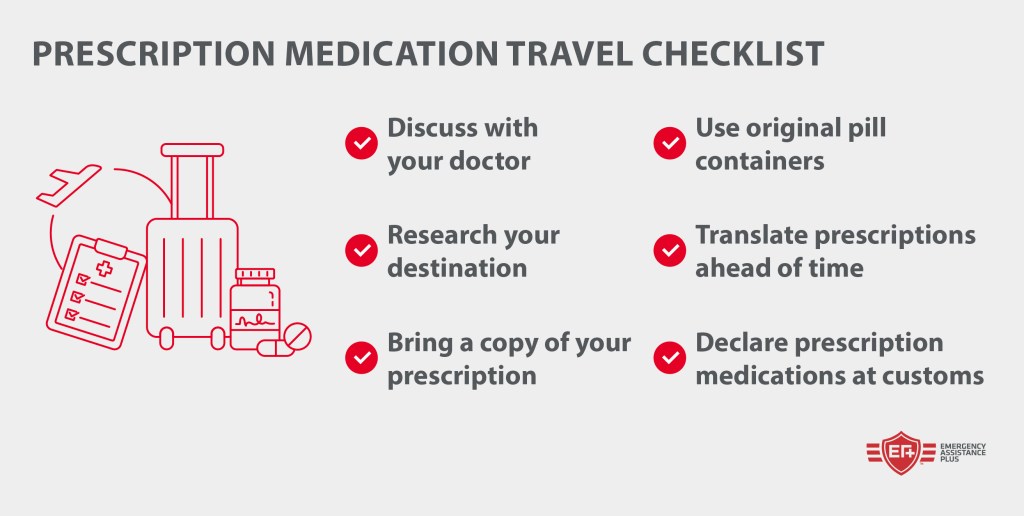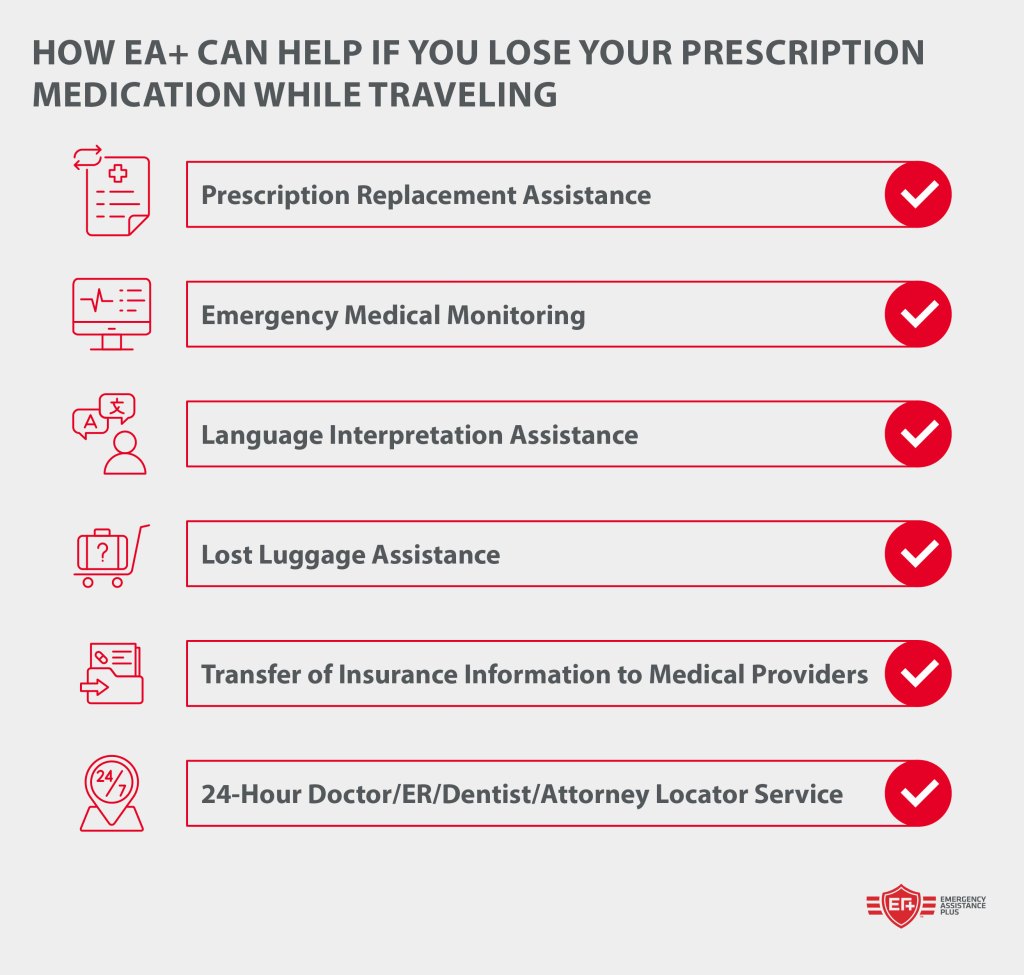Your questions about traveling with prescription medication—answered!
Published on September 21st, 2023 in Travel Tips
For people who take medications regularly or have a prescription, traveling can throw a wrinkle into their routine. Whether you forget to take your pills at the right time, you run out of a prescription, or you have issues with customs and airlines, traveling with medication presents a unique set of challenges.
With the right preparation, you can be better suited to avoid running into issues while traveling, or at least be in a better position to mitigate any unforeseen circumstances.
In this article we’ll break down how to travel with medications, including tips for preparation, general guidelines for the most common travel situations, and advice for what to do if things go sideways.
Let’s dive in.
Preparing your prescription medication for travel
The best advice we can give to ensure a hassle-free trip while packing your medications is to plan ahead. Here are some tips you can follow to ensure things go as smoothly as possible during your trip.
Discuss your trip with your doctor
Consult your doctor to ensure you have enough medication for the entire duration of your travel. If you’re running low on medication, ask your doctor for a refill before you leave. Calculate the length of your trip, including traveling days, to ensure you’ve packed the right amount of medication.
Carry a copy of your prescription
Obtain a written prescription from your doctor that includes the medication’s name, dosage, and your name. If possible, consider getting a letter from your doctor explaining your medical condition and the necessity of carrying the medication.
Research your destination
Check the laws and regulations related to medications in your destination country. Some medications that are legal in one country might be controlled substances in another. Also, research pharmacies at your travel destination. Take note of their opening hours and locations in case you need to refill your prescription or buy over-the-counter medications.

Pack medications properly
Store medications in their original packaging to avoid confusion and questions. If you’re carrying liquids or gels (like syrups or creams), follow the Transportation Security Administration (TSA) guidelines for carrying liquids in your carry-on bag.
Pack medications in carry-on luggage
Always keep your medications in your carry-on bag, not checked luggage. This way, they’re easily accessible and won’t be lost if your checked luggage is delayed or lost.
Check airline and TSA guidelines
Check the specific guidelines of the airline you’re flying with and the TSA regulations regarding carrying medications. You may be required to declare certain medications or medical equipment at security checkpoints.
Declare prescription medications at customs
If required by local regulations, declare your prescription medications when you arrive at your destination’s customs checkpoint. Show your written prescription if requested.
Note any difference in time zones
If you’re on a medication schedule, consider the time zone changes and adjust your dosing schedule accordingly.
Insurance and emergency contact information
Carry a copy of your health insurance information and emergency contact details in case of unexpected medical issues.
Maintain proper medication temperatures
Some medications require specific temperature storage. Consider using insulated bags if you’re carrying medications that need to be kept cool.
Language translation
If you’re traveling to a country where the primary language is different from yours, consider having a translation of your prescription and medical condition to facilitate communication with healthcare professionals.
While it may seem like a long list, it’s best to be prepared when it comes to your health and well-being.
Frequently asked questions about prescription medication and travel
In addition to our preparation tips, please see below for answers to frequently asked questions about traveling with medication.
Can you bring prescriptions on airplanes?
Yes, you can bring prescription medications on airplanes when you travel. See the guidelines and procedures you should follow above to ensure a smooth and hassle-free experience.
What types of medications can I take on a plane?
You can take a wide range of medications on a plane, both prescription and over-the-counter (OTC), as long as you follow the guidelines and regulations set by the airline and relevant authorities. See the guidelines and procedures you should follow above to ensure a smooth and hassle-free experience.
What are the most common legal issues people have when traveling with medication?
Here are some issues people have run into when traveling with prescription medication:
How much medication am I allowed to bring?
In general, it’s safe to bring 30 days’ worth of medication in most places, according to Dr. Julian Klapowitz of Travel Medicine Consultations. If you need to bring more than that, it’s a good idea to bring a doctor’s note and a copy of your prescription, as noted above. You’ll also want to plan for extra time at security if you have a large amount of pills or liquid medicine that doesn’t fit into traditional TSA guidelines.
What if you run out or lose your prescription medication while traveling?
In the event of an emergency situation where you don’t have access to your medication, there are several things you can try to do to resolve the situation:
Does travel assistance help with prescriptions while traveling?
It depends which travel assistance provider you have. Emergency Assistance Plus (EA+) provides prescription replacement assistance. If you are an EA+ member and you have an issue with your medication while traveling, all you have to do is call one phone number and we’ll get replacements to you as soon as possible.

We hope you found this post on traveling with medication helpful! If you’re planning a trip and think you may require this service, please feel free to reach out to our team with any questions or concerns.
For more information on services and costs, please feel free to check out our website or call us at 1-866-863-4460.

Our mission is to empower you on your adventures. Sign up today for our free monthly newsletter.
Subscribe TodayRelated resources

Destinations
Your comprehensive guide to exploring Europe's rivers through immersive and scenic river cruises.
Continue Reading
Destinations
Discover ten thrilling adventures for couples, from skiing in Aspen to surfing in Hawaii.
Continue ReadingIf a medical emergency occurs while you’re traveling—either domestically or abroad—you want to know that you and your loved ones are well-protected. Emergency Assistance Plus not only offers that protection but the peace of mind to explore the world with confidence.
